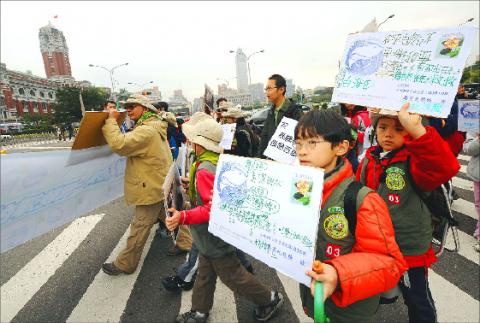Relocating the development project for Kuokuang Petrochemical Technology Co’s proposed eighth naphtha cracker overseas could be an option amid opposition to constructing the plant in Taiwan, Minister of Economic Affairs Shih Yen-shiang (施顏祥) said yesterday.
On a visit to Academia Sinica, Shih said that from an economic point of view, major development projects such as naphtha crackers should be built in Taiwan, but added that the government would not oppose relocating such projects overseas if the environmental cost was “too heavy to bear.”
“The government will not proceed with Kuokuang’s naphtha cracking project without the passage of an environmental impact assessment,” Shih said.

Photo: CNA
Shih made the remarks in response to questions by Chou Chang-hung (周昌弘), an Academia Sinica specialist in plant ecology and phytochemical ecology.
Chou said the proposed eighth naphtha cracker, as well as the operational sixth naphtha cracker in Mailiao Township (麥寮), Yunlin County, run counter to the government’s policies on energy-saving and reducing carbon dioxide emissions.
Chou said the sixth cracker had damaged land, air and water resources in areas near the plant.
Building a new cracker in Changhua County would cause further damage, with the proposed plant expected to account for 25 percent of the nation’s carbon dioxide emissions when operational, Chou said.
In related news, representatives of environmental protection and wildlife conservation groups accompanied 20 schoolchildren to the Presidential Office yesterday to deliver postcards to President Ma Ying-jeou (馬英九) asking him to protect Taiwan’s indigenous pink dolphins, which are facing extinction.
The proposed location of Kuokuang’s cracker is a 200-hectare stretch of wetland at the estuary of the Jhuoshuei River (濁水溪), which also forms part of the habitat of the pink dolphins, whose population is believed to number fewer than 100.

WANG RELEASED: A police investigation showed that an organized crime group allegedly taught their clients how to pretend to be sick during medical exams Actor Darren Wang (王大陸) and 11 others were released on bail yesterday, after being questioned for allegedly dodging compulsory military service or forging documents to help others avoid serving. Wang, 33, was catapulted into stardom for his role in the coming-of-age film Our Times (我的少女時代). Lately, he has been focusing on developing his entertainment career in China. The New Taipei District Prosecutors’ Office last month began investigating an organized crime group that is allegedly helping men dodge compulsory military service using falsified documents. Police in New Taipei City Yonghe Precinct at the end of last month arrested the main suspect,

A cat named Mikan (蜜柑) has brought in revenue of more than NT$10 million (US$305,390) for the Kaohsiung MRT last year. Mikan, born on April 4, 2020, was a stray cat before being adopted by personnel of Kaohsiung MRT’s Ciaotou Sugar Refinery Station. Mikan was named after a Japanese term for mandarin orange due to his color and because he looks like an orange when curled up. He was named “station master” of Ciaotou Sugar Refinery Station in September 2020, and has since become famous. With Kaohsiung MRT’s branding, along with the release of a set of cultural and creative products, station master Mikan

Eleven people, including actor Darren Wang (王大陸), were taken into custody today for questioning regarding the evasion of compulsory military service and document forgery, the New Taipei District Prosecutors’ Office said. Eight of the people, including Wang, are suspected of evading military service, while three are suspected of forging medical documents to assist them, the report said. They are all being questioned by police and would later be transferred to the prosecutors’ office for further investigation. Three men surnamed Lee (李), Chang (張) and Lin (林) are suspected of improperly assisting conscripts in changing their military classification from “stand-by

LITTORAL REGIMENTS: The US Marine Corps is transitioning to an ‘island hopping’ strategy to counterattack Beijing’s area denial strategy The US Marine Corps (USMC) has introduced new anti-drone systems to bolster air defense in the Pacific island chain amid growing Chinese military influence in the region, The Telegraph reported on Sunday. The new Marine Air Defense Integrated System (MADIS) Mk 1 is being developed to counter “the growing menace of unmanned aerial systems,” it cited the Marine Corps as saying. China has constructed a powerful defense mechanism in the Pacific Ocean west of the first island chain by deploying weapons such as rockets, submarines and anti-ship missiles — which is part of its anti-access/area denial (A2/AD) strategy against adversaries — the